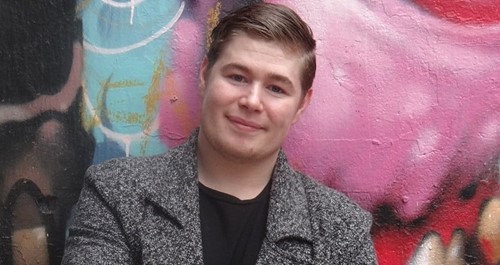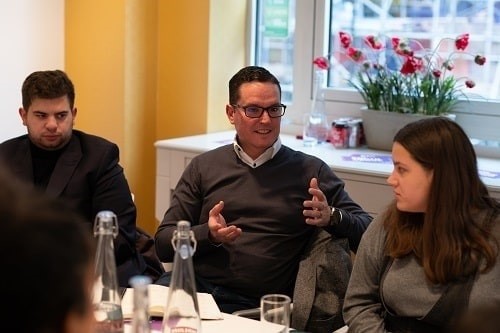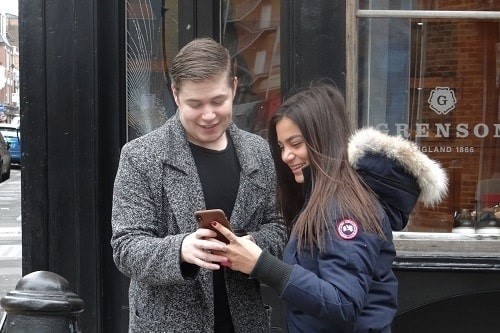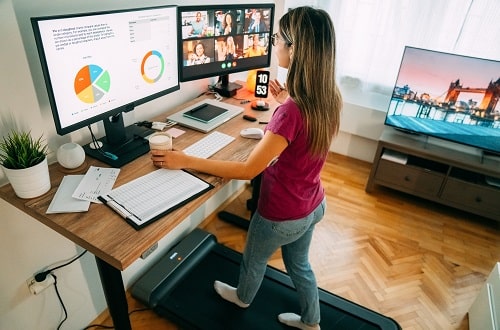Building on the experience of his challenging personal and professional journey and mental ill health, Jack Parsons decided to create Big Youth Group, a company that opens the door to employment for young people.
Features
Helping young people at a crossroads
Jack believes that only when people gain a true understanding of mental ill health will they be willing and able to help those affected.
He strongly relates to young people who start out on the bottom rung of the social ladder. “I grew up in Romford, Essex, with a single parent, an alcoholic mum. She was either drunk, asleep or violent. My home life was difficult but it quickly helped me learn some life skills and common sense. For me, school was a place to retreat for peace and quiet. I didn’t understand why it was important to go to school because my mum was saying: ‘You don’t need school. If you don’t want to go, don’t go.’
“The only subjects I was good at were art and design technology. Just before my mock GCSEs, my form tutor said to me: ‘You’re going to fail your GCSEs, so university is not for you. Why don’t we look at a list of construction sites where you could find a job?’ In front of everyone, he gave me a list of 60 construction sites. Other pupils received a list of sixth form colleges.
It was a turning point in my life. I decided that I was going to start revising for my GCSEs. I went home and stuck post-it notes of varying colours denoting different subjects on the walls and started studying. For the next three months that was all I did. Sometimes, when I came home after my morning paper round, the post-it notes would have been ripped off my bedroom wall because my mum didn’t want them there.

Jack Parsons founded Big Youth Group to connect young people with work and life mentors
“When I opened my results, I thought they were wrong. I had achieved 11 GCSEs from A* to C. I had got an A* in arts and technology and a C in maths. It made me realise that everything is possible. The same form tutor told me: ‘We made a mistake. We apologise. We’d better quickly get you into sixth form.’ However, I decided to get some experience of real life first.
“My experience of the education system has taught me that there’s no advice on what to do next. The system is like a conveyor belt; young people are pushed into it and are spat out at the other end with none of the skills required to survive in the real world. Very few companies know how to put together a programme that can support young people, particularly those from disadvantaged backgrounds.
“Meanwhile, my mum’s drinking had got much worse. I went to live with my dad, a black cab driver. With him nudging me along, I secured a two-year business apprenticeship with an insurance broker in Romford. It was the equivalent of two A-Levels, which would secure me a university place in the future. On my first day, I was told ‘You’ll be cold calling. That’s the role.’ For the next 13 months, I was calling people from a random list of numbers and asking them whether they had a driving licence. If they said yes and hadn’t put the phone down by then, then I would ask them if they had a car. If they said yes, I would transfer the call to the ‘big boys’ table, the insurance sellers. They liked me there because I was a young person with little experience but I was trying hard. At the end, I had to decide whether to go to university or stay with the company. My boss told me ‘You’ve done really well here. You can grow.’I made the decision to stay. Three weeks later, after university applications had closed, the company went bust.
“I came across a job in the City at a recruitment consultancy. I didn’t know what it meant and they sold it to me as essentially a posh broker earning loads of money. ‘You will be putting people into jobs and changing their lives.’ They accepted me even though they ordinarily only took on interns with degrees. It was a high-pressure sales environment, with some 400 people on the phones all the time. They took me on for three months’ work experience, unpaid. I tried very hard, and, in the first three months, I generated £60,000 for the company. They gave me a full-time job and I went on to set up a new education desk, putting teachers into jobs.
My duvet flip
“It was my opportunity. There was a lot of money to be made and I knew how important money was. However, I also needed a purpose in my life, something worthwhile and that was worth waking up for in the morning. Nowadays, when mentoring young people and business leaders, I ask them: ‘What is your duvet flip in the morning? Is it your family and spending quality time with them?, is it that you’ve got a great team? Is it your own development and growth?’ I believe that no matter who you are and what stage of your life and career you are at, you should always have your duvet flip. My duvet flip is remembering where I came from. I was a disadvantaged young person and I could’ve taken the wrong road, i.e. drugs, alcohol, crime.
“My duvet flip is helping young people standing at the crossroads to take the best path for them. No matter what age you are, everyone needs a helping hand. You could be a 16-year-old looking for their first full-time job, or a 30-year-old looking to start a business. Finding the best way to support them at that moment in time is my duvet flip. Diversity, inclusion and belonging are very important factors in my business mission.

Jack has created a series of Big Youth Group breakfast sessions to bring together influential individuals who could help improve employment opportunities for young people in the UK
Up and down again
“Back at the executive recruitment consultants, I became their second top biller, earning £700,000 for the company at the age of 21. Placing people into jobs, I earned £75,000 a year. My duvet flip at that time was putting the right people into the right jobs and giving the right career advice. One day, I placed a teacher into a job and it proved to be a big mistake, as he was a bad teacher. That placement made the company £8,000 and netted me a £2,000 commission. Despite this, I felt that I had let down 120 young people, as that teacher was going to be head of English. I agonised and made the decision to speak up. When I spoke up, I was asked to leave the company.
“The following Friday, my things were put into a Tesco carrier bag and I was let go. I was 22 and felt that my life had just collapsed. That weekend, I sat at the kitchen table and did a lot of thinking. I decided that I would never again work for someone else. I would start a business I believed in, using the £20,000 I had saved. I didn’t know whether this would be a limited company, a charity or a social enterprise –at the time, I didn’t know the difference between them– but I knew that I wanted to help young people. I called a good friend of mine and said to him: ‘You know marketing. I know how to get into the doors of people and how to talk to them. Why don’t we set something up?’ He suggested that we start a technology business, which would grow fast. We decided to have equal shares in the business.
“I tried to reach as many people as possible. I read an article by Richard Branson who said: ‘People buy from people and it’s all about personal branding.’ I took a picture of two cups of tea and put it on Twitter with a message, ‘Great day for meetings.’ Those two cups of tea were drunk by me in the coffee shop in Romford. It was tweeted and retweeted and it reached about 2,000 people. I contacted every person who retweeted it, which resulted in five meetings. I came with my notepad and discussed my contacts’ experience and how we could work together. It was a sort of skills swap. I kept referring people to each other and gathering contacts and expertise. Within six months of doing that, we had a proper business plan. I gained three advisors who wanted to join my non-existent business, because they could see my ambition. Among them was Paul Frampton, the CEO of Havas Media Group, at the time, the fifth largest media company in the world. He became my business mentor.
Business and life mentoring
Jack’s work with Paul Frampton shaped his views on the importance of mentoring at work and in life. “I believe that everyone, especially business leaders – it’s lonely at the top! – should have mentors. A lifestyle mentor can help you on a personal level by asking questions, such as ‘How are you today? Are you taking enough time off work?’. You should also seek a career mentor. It doesn’t need to be a top executive. Career mentors should be forward-looking people who relate to you and understand your ambitions. Most of us would also benefit from having a personal development mentor, whom I would refer to as a ‘soft skills mentor’, who could be direct and critical with you. For example, they could say: ‘You don’t look people in the eyes when you speak to them. You should slow down when you talk.’ This mentor would help you to grow as an individual.”
Jack’s first business was a youth technology platform called Yourfeed. Its aim was to help young people showcase their skills beyond a CV. It raised over £1 million of investment and grew to an eight-million-pound company in just 18 months. “I managed to attract some great people to the company and had big names on the board, such as the managing director of the Bank of New York Mellon Corporate. The company grew very quickly, supported by brands such as Facebook. I tried to stay level-headed when faced with various platitudes but how do you respond when the ex-CEO of the London Stock Exchange says, ‘Jack reminds me of the next Richard Branson’.”
In late autumn 2017, Yourfeed was closed down by mutual agreement when a number of investors, who sat on the board, tried to control the company too much. “The purpose of the company was to help young people, particularly those without a degree, to get their foot in the employers’ doorway. It was about passion and a clear purpose, not return on investment.

Big Youth Group has a community of over 1,200 people engaged via WhatsApp
Coming out of the ‘black hole’
“I locked myself in my apartment, feeling that the world had just collapsed. I lost my duvet flip. I didn’t want to see anyone and didn’t care about what was going on. What I also didn’t know was that I was sinking into depression. Mental health was an alien concept to me. I spent November and December doing nothing. I was thinking, how I can help anyone if I cannot help myself?
“It was a very difficult period. There were times when I just didn’t want to be here anymore. Yet during that time, I also discovered a number of positive things. I became closer to my dad and recognised who my real friends were. I also realised that everyone deals with stress, anxiety and other aspects of poor mental health differently, so you cannot say: ‘Yes, I know how you feel’. As a result of the stigma around mental health, it took me three months to admit that I had been experiencing problems. I wrote a LinkedIn post admitting that I was hiding from the world: ‘Am I alone in feeling like this?’ That post received 5,517 Likes and 997 comments, as well as 25,000 personal messages.
“In early spring 2018, Paul Frampton called me and said: ‘Jack, come on. Let’s do something. Your business was such a great success. You’ve got access to many senior business people. You need to do this, not to let down these young people’.”
Jack and Paul started the Big Youth Group in February 2018. It aims to create a community of two million young people and connect some 400,000 of them to work-life experiences, including jobs, apprenticeships, internships and mentors. The company focuses on helping young people at different stages of their life and work and it provides mentoring for them. The company already has a community of over 1,200 people engaged via WhatsApp, from full-time mentors to volunteers and ambassadors. “We’re working with some 200 brands, including Accenture, GoDaddy and Sage and we will soon be launching the Big Youth Accelerator, which will provide 10 startups with under-30 founders with a community of 200 business mentors. We are also talking to the governments of New Zealand, USA and Australia about helping young people in these countries.
“I want to make sure that we are working in an impactful and meaningful way. The COO of Google UK sits on our group advisory board and one of my personal life coaches is Jacqueline de Rojas, the president of techUK and Paul Frampton, now chair of Big Youth Group.
“I am also looking after my mental health. In December 2018, I went on a digital detox, which proved very hard for me. However, it has been a great thing. It’s given me clarity on the real world. I also realised that I wanted to become more vocal about mental health. My message to young people is: Firstly, it’s okay to experience mental ill health. Secondly, people close to you might not recognise the symptoms and understand what’s happening to you. Your friend may be giving you the wrong advice. Thirdly, you need to seek specialist advice. Even if you don’t think you need help, try. A specialist will help you to understand what’s happening to you.
“I waited too long. I was ill for 11 months. If I had understood my condition, I would have been in a much better place over that period. It’s also worth remembering that there is a lot of advice and help on the internet on ways of coping with stress and anxiety, tips on how to stay positive. One can start from speaking to friends and family and you can also share your story through social media. This encourages others to be open about their mental health problems.
“The stigma is still there and a lot of work needs to be done to change people’s perceptions of mental health. We should start from educating those who have never personally experienced ill mental health. People now live in their own bubbles. Only when they gain an understanding of mental health will they begin to care.”
To get involved in the Big Youth Group breakfast, tweet Jack at @BigYBreakfast or @JackParsons_CEO
FEATURES

Sedentary working and how to combat the ‘sitting disease’
By Gavin Bradley, Active Working on 05 April 2024
Prolonged and excessive sitting poses a major risk to our health, but the Get Britain Standing campaign and On Your Feet Britain Day on 25 April are a great way of encouraging workers to sit less and move more.

Company culture and wellbeing: a crucial link
By Bex Moorhouse, Invigorate Spaces on 05 April 2024
Investing in measures to support worker wellbeing will be ineffective unless the company culture genuinely incorporates values like teamwork, involvement, flexibility and innovation.

Office design and culture: happier and healthier staff – or the opposite?
By Guy Osmond, Osmond Ergonomics on 03 April 2024
Applying ergonomic principles to workstation set-ups and ensuring the physical environment supports neurodivergent people are just some of the ways of creating an office where everyone can thrive, but a supportive and positive organisational culture is vital too.


